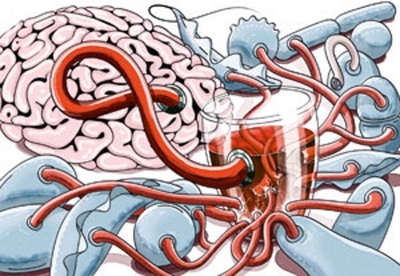There’s a virus that makes you stupid, scientists say!
Researchers at Johns Hopkins and the University of Nebraska
say that the algae virus affects human cognitive functions.Chris Matyszczyk source
Do you have days when you just can’t get anything right?
Are there times when you stare at yourself in the mirror somewhere around midnight and say: “Why the hell did I do that?”
I’d like to offer you hope. It may be that you’re not innately stupid, silly, dumb, brain-dead or even gormless. Indeed, it may well be that you’ve got an algae virus that’s messing with your cognitive systems.
My own brain was moved, you see, by the Independent which muttered that scientists had discovered a virus that “makes you stupid.”
I immediately inserted medical instruments inside my cranium — without anesthetic — to see if I could find this virus, which might be my excuse for a thousand silly actions.
Well, I wanted to.
Instead, I went to look at the study, published by the National Academy of Sciences of the United States of America. “Chlorovirus ATCV-1 is part of the human oropharyngeal virome and is associated with changes in cognitive functions in humans and mice.”
A large group of scientists from both Johns Hopkins University and the University of Nebraska examined microorganisms that populate our “mucosal surfaces.”
A surprise discovery was that the ATCV-1 virus — which comes from algae — seemed to affect human cognition. Previously, it had been thought that humans weren’t prone to being infected by this virus. However, in taking throat swabs from 92 people, the researchers found 40 of them had the virus.
The research report says: “The presence of ATCV-1 DNA was not associated with demographic variables but was associated with a modest but statistically significant decrease in the performance on cognitive assessments of visual processing and visual motor speed.” The decrease was around 10 percent.
The scientists tested this result by injecting mice with the same virus. They say the results were similar.
When they found the virus, the scientists weren’t sure what it was. They discovered it had previously been found in green algae which inhabit rivers and lakes.
But if such a high proportion of the guinea pigs in this study had the virus, what if 40 percent of the world is also adorned by it? Might this explain some of the more macro aspects of human behavior, such as voting patterns, fast-food worship and Prius-driving?
Moreover, how easy is it to catch the virus and suddenly lose a promotion, a spouse or one’s way home?
The University of Nebraska’s Professor James L. Van Etten, a member of the research team, told Newsweek that currently there was no indication this virus was contagious.
He added: “My best guess is that these viruses may infect another microorganism besides the algae that we have been studying… This other microorganism may be the way that the virus gets into the throat.”
A scientist armed with a best guess is like a soldier with a water pistol.
Somewhere, somehow, there might a thing living inside you that makes you do 10 percent more inadvisable things than you would normally do. And, let’s face it, you do quite a few inadvisable things every day.
We don’t know where the virus might have come from. But there’s a chance that it might interfere with our thought-processes at vital moments.
Should we be surprised? We have to take so many cognitive decisions every day. We fancy ourselves as intelligent beings, but we’re really quite primitive sorts, easily affected by all sorts of stimuli, some of which are clearly deleterious.
We make mistakes all the time. The notion that there might be a virus that hinders our cognitive processes feels both a touch frightening and quaintly reassuring. imagine the excuses that would pile up thick
- I’m sorry about the affair, darling. It was the virus.
- Please miss. The virus messed up my homework.
- No, officer. I wasn’t speeding, but my virus was.
Virus that ‘makes humans more stupid‘ discovered!
A virus has been discovered that affects cognitive abilities in healthy people

A virus that infects human brains and makes us more stupid has been discovered, according to scientists in the US.
The algae virus, never before observed in healthy people, was found to affect cognitive functions including visual processing and spatial awareness.
Scientists at Johns Hopkins Medical School and the University of Nebraska stumbled upon the discovery when they were undertaking an unrelated study into throat microbes.
Surprisingly, the researchers found DNA in the throats of healthy individuals that matched the DNA of a virus known to infect green algae.
Dr Robert Yolken, a virologist who led the original study, said: “This is a striking example showing that the ‘innocuous’ microorganisms we carry can affect behaviour and cognition.
“Many physiological differences between person A and person B are encoded in the set of genes each inherits from parents, yet some of these differences are fuelled by the various microorganisms we harbour and the way they interact with our genes.”
Of the 90 participants in the study, 40 tested positive for the algae virus. Those who tested positive performed worse on tests designed to measure the speed and accuracy of visual processing. They also achieved lower scores in tasks designed to measure attention.
Humans’ bodies contain trillions of bacteria, viruses and fungi. Most are harmless, but the findings of this research show that there some microbes can have a detrimental impact on cognitive functions, while leaving individuals healthy.
The study’s findings were published in the Proceedings of the National Academy of Sciences.
a common ‘algae virus’ found in humans
really can make you dumb
![Ed Bierman [CC BY 2.0 (https://creativecommons.org/licenses/by/2.0)], from Wikimedia Commons](https://goodshepherdmedia.net/wp-content/uploads/2023/01/Red_algae-1024x553.jpg)
Found: The viral infection that makes nearly HALF of us more stupid
(and it lasts for YEARS)
- The virus – called chlorovirus ATCV-1 – was only known to appear in algae
- Researchers in U.S. have not established how it comes to infect humans
- It hasn’t infected just swimmers, which rules out direct link to algae itself
- Instead humans could’ve been carrying virus but was not known to doctors
- Research suggests it alters genes in brain including memory and emotion
- Scientists found 44 per cent of patients tested had virus in their throats
- Virology researchers at John Hopkins accidentally discovered a virus that is commonly found in algae, ACTV-1, that was harbored in 43% of the healthy volunteers in their study.
- Subjects who carried the virus performed 10% worse on cognitive testing, with significant decreases in function in visual processing and visual motor speed.
- The reason that this has generated so much attention is because of concerns that small, unrecognized bacterial or viral infections harbored by humans may contribute to cognitive decline or stealth illness.
Nearly half of us could be infected with a virus which makes us more stupid, scientists have found. The startling discovery suggests that millions may be carrying a long-lasting infection which dulls the brain. Scientists found the virus living in the throats of 44 per cent of patients tested in a small US study. Those who were carrying the infection performed worse in intelligence tests, even when education and age were taken into account.The virus – called chlorovirus ATCV-1 – was previously only known to appear in green algae in freshwater lakes. The researchers, from Johns Hopkins University in Baltimore and the University of Nebraska, have not established how the virus comes to infect humans.It does not seem to have infected just swimmers or watersports fans, probably ruling out a link to algae itself. Instead it could be that humans have long carried the virus, but it had not previously been looked for by doctors. Study author Professor Robert Yolken, of Johns Hopkins medical school, said the millions of viruses living in the human body are being investigated by experts for the first time.
‘We’re really just starting to find out what some of these agents that we’re carrying around might actually do,’ he told the Healthline website. ‘It’s the beginning, I think, of another way of looking at infectious agents — not agents that come in and do a lot of damage and then leave, like Ebola virus or influenza virus. ‘This is kind of the other end of the spectrum. These are agents that we carry around for a long time and that may have subtle effects on our cognition and behavior’s.’ The research, published in the Proceedings of the National Academy of Sciences, suggests that the ATCV-1 virus alters the genes in the brain. The team found the virus in throat swabs from 40 out of 92 volunteers, and discovered those with the virus performed measurably worse in cognitive testing. They then confirmed their findings in tests on mice. Giving the virus to mice resulted in a decrease in recognition memory and other brain functions, they found. Tests showed the virus had broken through the barrier between blood and tissue, altering the activity of genes in the brains of the mice.
The genes affected including those producing dopamine – a vital hormone which influences memory, spatial awareness, emotion and pleasure.+5

But the virus does not seem to have infected just swimmers or watersports fans, ruling out a link to algae itself

The virus – called chlorovirus ATCV-1 – was previously only known to appear in green algae in freshwater lakes. Professor James Van Etten, a biologist from the University of Nebraska who first identified the virus in algae 30 years ago, said: ‘There’s more and more studies showing that microorganisms in your body have a bigger influence than anything anyone would have predicted, and this could be something along those lines.’
Professor Yolken added: ‘The thing that’s different about what we found is that chlorovirus ATCV-1 is something that we wouldn’t have suspected would actually have any effect on humans or animals. ‘It points us in a direction of looking to see if we can improve people’s cognition, their behaviors’, by changing the composition of their microbiome [the balance of bacteria and viruses in the body].’
What doesn’t kill you makes you dumber
Published online 2012 Feb 10. doi: 10.1038/embor.2012.13 Philip Hunter1 source
Abstract
A causal link between childhood exposure to disease and the development of intelligence would have major implications for public health and international development programs.
The idea that infectious disease during childhood affects the developing brain to impact intelligence has been around for decades. Recent evidence from more rigorous studies, which have controlled carefully for other factors such as nutrition and education, has strengthened the case. If these new epidemiological and molecular studies really do confirm a clear link between childhood infection and intelligence, the consequences for health policy and development assistance could be profound. The results could mandate an increased focus not only on eradicating or controlling infectious diseases, but also on reducing their impact on children in the absence of cures or vaccines.
If these … studies do show a clear link between childhood infection and intelligence, the consequences for health policy and development assistance could be profound
Yet, even in the light of new evidence, it is hard to unravel causes from effects, and the debate continues over which diseases are most responsible, along with the precise physiological and molecular mechanisms involved. There is no shortage of theories to explain why infectious disease seems to have so profound an effect on intelligence, and, as a result, on the intellectual and economic performance of whole nations or regions. The stage is set for more studies to drill down into neurological and cognitive mechanisms: to explain why the prevalence of infectious disease is a reliable predictor of intelligence at the population level; to differentiate between the impact of various pathogens; and to identify the evolutionary rationale of these links. There is also mounting evidence that some parasites can alter their host’s personality through mechanisms evolved to modify their host’s behaviour to their own advantage, which could explain environmental risk factors for mental disorders, such as schizophrenia.
After a few intermittent references earlier last century, the US economist Andrew Kamarck made the first attempt to link infectious disease with a nation’s performance during the 1970s [1]. Kamarck identified the interplay of three factors—temperature, humidity and infectious diseases—on the economic performance of nations through their impact on vitality and intellectual attainment.
Somewhat surprisingly, both economists and biologists neglected Kamarck’s findings that link infectious disease and either intelligence or performance at a population level for another three decades. Eventually, Christopher Eppig and colleagues at the University of New Mexico in Albuquerque, USA, published a seminal paper in 2010, which reported a strong correlation between the prevalence of infectious disease in a country and intelligence as measured by supposedly culturally independent IQ tests [2]. In the past, other environmental factors, such as average temperature, have been shown to affect intelligence, but in Eppig’s study, infectious disease seems to trump these. The country with the highest average IQ of all, Singapore, is hot and humid, but has the world’s lowest rates of infectious disease largely because of excellent healthcare.
The Eppig study also offers a plausible explanation for the so-called Flynn Effect, named after the political scientist James Flynn who described and promoted the apparent sustained and significant increase in average intelligence in many developed nations during the past half-century or more [3]. “Our research suggests that infectious disease may be the most important factor influencing IQ,” Eppig confirmed. “Infectious disease has the strongest correlation with average IQ, and the largest independent contribution when other factors are controlled.” The researchers found that the correlation between average IQ and infectious disease at the cross-national level is between −0.76 and −0.82; 0 would equate to no correlation and −1 would be total correlation. The results indicate a high degree of correlation, and, just as importantly, the study determined that the probability of this correlation having occurred by chance was incredibly low.
The intelligence scores were largely taken from an earlier study conducted by UK psychologist Richard Lynn and Finnish political scientist Jaan Mikk, which analysed IQ scores from 113 countries [4], and the data on infectious diseases were provided by the World Health Organization. Given that both sets of data were openly available, it was easy for other groups to perform their own analyses to either corroborate or refute Eppig’s findings. Chris Hassall and colleagues at Carleton University in Ottawa, Canada, have done just such a follow up to identify or eliminate any statistical artefacts that might weaken or cast doubt on the findings [5]. One of the significant possible artefacts for which Hassall controlled is a phenomenon known as autocorrelation, which is the tendency for two sets of data to seem to be linked just because they have similar spatial patterns of variation. “Having reanalyzed the data, I am fairly convinced that there is a strong correlation between the health impacts of parasites and IQ,” Hassall confirmed. In fact, Eppig himself suggested that Hassall’s results were stronger than his own. “They found that, when controlling for spatial autocorrelation, infectious disease was an even better predictor of average national IQ than our own analysis had found,” he commented.
Meanwhile, Eppig has published another study analyzing the correlation between disease and intelligence within a single country [6]. He chose the USA because there is good data available for individual states, with sufficient variation across the country as a whole to provide the necessary range of data. This study was conducted partly in response to criticism of the first one on the grounds that national differences in culture and education might not have been fully filtered out. By studying just one country with a significant degree of cultural and educational harmony, Eppig hoped to provide an even more convincing case for the link between infectious disease and IQ.
According to Michael Woodley, who has been studying the link between infectious disease and intelligence at the University of Surrey, UK, the correlation found in the US study is not as strong, but is still significant. “They found a weaker set of relationships, but infectious disease was still a potent predictor of cross state variance in IQ,” Woodley said, but added that these studies beg the question of cause and effect. “The question is, have they found evidence that infectious disease has a causal influence on IQ, or is it the case that cross national patterns of IQ affect disease ecology?” he explained. The suggestion is that intelligence itself can affect the prevalence of disease. “My cautious take is that it’s a bit of both.”
Hassall conceded that his and the other studies have only identified a correlation between infectious disease and intelligence, albeit a strong one, and not a causal link. But he added that there were plausible underlying physiological explanations for the link, although as yet there is no definitive proof for any.
“We can only speculate about the possible causal links,” agreed Joachim Kurtz, a group leader whose lab works on animal evolutionary ecology at the Westfälische Wilhelms–Universität Münster in Germany. “There are at least two non-exclusive possibilities: firstly, given that the brain needs a lot of energy, the energetic costs of parasitic infection and immune defense may provide a mechanistic explanation for the correlation […] a second, slightly frightening and more direct possibility is that parasite manipulation might make hosts stupid.”
The first possibility could be caused by the need to reroute energy from the brain to repair tissue damaged by parasites, or by energy lost through malnutrition as a result of diarrhoea, vomiting, or diminished absorption through the digestive tract. It could also result from the parasite accessing cellular or macromolecular resources at the expense of the developing brain, or by the energy cost of maintaining a heightened immune response. All these factors might decrease the energy and nutrients available to the developing brain and cause reduced cognitive capability.
The second possibility cited by Kurtz might involve direct damage to, or alteration of, neurological mechanisms, perhaps deliberately engineered by the parasite for its advantage. The case of rabies is an extreme example of an infection in which the parasite, a virus infecting nerve cells and causing acute encephalitis, changes its host’s behaviour to increase the chance of its spreading, in this case causing the host to bite others and spread the virus through saliva.
But there is growing evidence that parasites causing chronic infections can alter behaviour in more subtle ways to increase the chance of transmission. Kurtz cited the case of the protozoa Toxoplasma gondii, referring to a recent paper by Czech parasitologist Jaroslav Flegr from Charles University, Prague, which found that infection can trigger various psychiatric and neurological diseases, including schizophrenia, in people with genetic predispositions [7].
“Dozens of studies published in the past 20 years clearly show that toxoplasmosis is responsible for a large number of cases of schizophrenia,” Flegr noted. “Recent results, some of them published by our group, show that toxoplasmosis-associated schizophrenia has more severe clinical symptoms than other kinds of schizophrenia.” Such symptoms were associated with noticeable changes in brain morphology and included impaired reaction times as well as personality changes, Flegr added. Together, these changes were found to increase the risk not just of suicide but also accidental injury or death [8,9]. Adding these factors together, Flegr estimated that latent toxoplasmosis is indirectly responsible for more than one million deaths per year, which would make it the world’s second most dangerous protozoan parasite after malaria, albeit indirectly killing its victims.
In the case of T. gondii the same ‘chicken and egg’ question arises of whether infection causes the psychiatric disorders, or whether psychiatric disorders make infection more likely. According to Flegr, there is molecular evidence to support the hypothesis that infection causes psychiatric disorders. “It has been known for a long time that toxoplasmosis increases the concentration of dopamine in the infected brain,” he said. “In 2009 it was shown that the genome of Toxoplasma contains genes for two rate-limiting enzymes for synthesis of dopamine in the brain tissue [10]. Another study then demonstrated that large amounts of this neurotransmitter are synthesized in cysts of Toxoplasma in the brains of infected laboratory animals [11].”
There has been growing evidence that such disruption in dopamine production does increase the risk of developing schizophrenia [12]. Flegr speculated that this manipulation of the host’s neurotransmitter production, primarily an increase in dopamine combined with a decrease in serotonin, has its roots in animal evolution. “At least some of the changes are most probably results of manipulative activity of the parasite aimed at increasing efficiency of transmission from an intermediate animal to definitive host by predation,” he explained. “Some are probably just side effects of chronic disease.”
Although infection by T. gondii is particularly common in Africa and South America, Flegr noted that it also has a high incidence in cooler and drier regions, being associated with the consumption of raw vegetables and raw meat. The latter factor perhaps explains its high prevalence in France and Germany, where 40–50% of the population are infected, compared with less than 20% in the UK and USA. These are large figures nonetheless, so the recent findings highlight the urgency of further research to understand the genetic risk factors that predispose infected individuals to neurological illness.
When it comes to the less clearly defined issue of intelligence, researchers are just beginning to identify candidate genes in the host. Among the best known is microcephalin, a gene known to regulate brain size, but the precise role of which in intelligence has yet to be explained. However Heiner Rindermann from the Institute of Psychology at Chemnitz, Germany, has found evidence that high levels of microcephalin within a population seem to be associated with low levels of disease and higher intelligence [13]. “Microcephalin does not predict IQ at the individual level, but it does at ecological scales,” Rindermann said. The reason the operation of microcephalin can only be seen at the population level, he explained, is that it does not provide any physiological protection against disease but does make people more sensitive to dirt and more likely to indulge in hygienic behaviour, which affects all people in the vicinity.
“The role of infectious disease burdens as the principal mediator of this ecological relationship suggests that populations exhibiting high levels of microcephalin were better able to cope with historical disease burdens,” Rindermann reasoned. “We believe that microcephalin might have encoded for disgust sensitivity, hence more sensitive populations transitioning out of the hunter-gatherer mode of subsistence and into the agrarian one could have carried on growing such that the frequency of IQ-enhancing mutations could have increased via runaway gene-culture co-evolution.”
This three-way link between microcephalin, disease and intelligence remains speculative, but the overall association between infectious parasites and broad cognitive behaviour is increasingly well established. It is not yet clear, though, which diseases are the main culprits, with a few exceptions such as T. gondii for psychotic disorders. Differentiating between the different pathogens is one of the main targets for research in the field, according to Eppig. “We have not done empirical work on this question yet, although we have a project in the works, but our hypothesis predicts that the infections that cause the greatest amount of energy to be diverted away from the brain will have the largest detrimental effect,” he said. “This means that long-term, chronic, infections are more likely to have a greater detrimental effect on the brain than short-term infections. In particular, we predict that parasites causing diarrheal diseases, malaria and tuberculosis, to name a few, will have the largest effect.”
However, Woodley commented there is evidence that sexually transmitted diseases rather than diseases of the intestinal or respiratory tracts have the largest impact on intelligence. But these diseases are often chronic, although Woodley suggested that the correlation could simply result from people with higher IQs being less likely to catch them.
All this research paints an increasingly detailed picture of how infectious diseases and the development of intelligence are linked; but there is clearly much more to be done to unravel the underlying mechanisms. The evidence already accumulated indicates that continuing efforts to eradicate disease in the developing world should be increased. However, as Hassall pointed out, the societal case for doing that stands on its own and does not need to be associated with intelligence.
References
- Kamarck A (1976) The Tropics and Economic Development: a Provocative Inquiry into the Poverty of Nations. Baltimore, MD, USA: The Johns Hopkins University Press [Google Scholar]
- Eppig C, Fincher CL, Thornhill R (2010) Parasite prevalence and the worldwide distribution of cognitive ability. Proc Biol Sci 277: 3801–3808 [PMC free article] [PubMed] [Google Scholar]
- Flynn JR (1987) Massive IQ gains in 14 nations: what IQ tests really measure. Psychol Bull 101: 171–191 [Google Scholar]
- Lynn R, Mikk J (2007) National differences in intelligence and educational attainment. Intelligence 35: 115–121 [Google Scholar]
- Hassall C, Sherratt TN (2011) Statistical inference and spatial patterns in correlates of IQ. Intelligence 39: 303–310 [Google Scholar]
- Eppig C, Fincher CL, Thornhill R (2011) Parasite prevalence and the distribution of intelligence among the states of the USA. Intelligence 39: 155–160 [Google Scholar]
- Flegr J (May2007) Effects of Toxoplasma on human behavior. Schizophr Bull 33: 757–760 [PMC free article] [PubMed] [Google Scholar]
- Flegr J, Klose J, Novotná M, Berenreitterová M, Havlícek J (2009) Increased incidence of traffic accidents in Toxoplasma-infected military drivers and protective effect RhD molecule revealed by a large-scale prospective cohort study. BMC Infect Dis 9: 72. [PMC free article] [PubMed] [Google Scholar]
- Yagmur F, Yazar S, Temel HO, Cavusoglu M (2010) May Toxoplasma gondii increase suicide attempt—preliminary results in Turkish subjects? Forensic Sci Int 199: 15–17 [PubMed] [Google Scholar]
- Gaskell EA, Smith JE, Pinney JW, Westhead DR, McConkey GA (2009) A unique dual activity amino acid hydroxylase in Toxoplasma gondii. PLoS ONE 4: e4801. [PMC free article] [PubMed] [Google Scholar]
- Prandovszky E, Gaskell E, Martin H, Dubey JP, Webster JP, McConkey GA (2011) The neurotropic parasite Toxoplasma gondii increases dopamine metabolism. PLoS ONE 6: e23866. [PMC free article] [PubMed] [Google Scholar]
- Howes OD, Kapur S (2009) The dopamine hypothesis of schizophrenia: version III—the final common pathway. Schizophr Bull 35: 549–562 [PMC free article] [PubMed] [Google Scholar]
- Woodley MA, Stratford J, Rindermann H, Bell E (2011) Could microcephalin have been a gateway mutation? The 12th Annual Conference of the International Society of Intelligence Research, Limassol, Cyprus, 8–10 Dec. www.isironline.org
The Virus That Could Be Making You Dumber

You may have heard the saying, “You can’t catch stupid” — meant to console you that idiocy is not contagious. But, as it turns out, in a small way it might be. Scientists have discovered that a foreign virus in some peoples’ throats parallels with those individuals’ poorer cognitive performance. And when mice are given this virus, previously thought to only infect algae, they were slower to learn a maze.
Surprise Virus
Scientists stumbled on their discovery while collecting throat swab samples from people to assemble a virome — a genetic profile of all the viruses circulating through our bodies. During the analysis, researchers were surprised to find DNA of chlorella virus ATCV-1, a virus common in aquatic environments but not thought to infect humans or animals. What’s more, the virus was common: It was detected in 40 out of the 92 participants. It didn’t appear that age, sex, race or any other external factors affected a person’s chance of harboring the virus.
Dumbed Down
Fortunately for researchers, their original experiment included standardized tests to measure participants’ visual processing and motor skills. So, with the new variable — ATCV-1 — in the forefront, scientists switched gears to examine whether the newly discovered virus affected cognitive performance. And they found it did: people infected with the virus performed significantly worse on cognitive tests than did their uninfected counterparts. That warranted further study, so esearchers then tested how the virus affected mice. They infected 30 mice with ATCV-1 and put them through a series of maze tests. These mice took much longer to explore a novel maze setup than mice in the control group, researchers reported in
Proceedings of the National Academy of Sciences.
Mind Control
ATCV-1 is common in most inland waters such as those around Baltimore, where the study was conducted. Therefore, exposure to the virus is probably common, but why some people acquire infection while others don’t is still unknown. Answering this question, researchers say, will guide future studies on ATCV-1. In the meantime, it’s a fascinating and freaky example of how microbes can mess with our brains. Robert Yolken, the virologist who led the study, told The Independent,
“This is a striking example showing that the ‘innocuous’ microorganisms we carry can affect behavior and cognition.”
No, Dummy, Scientists Didn’t Find A Stupidity Virus
Some rather alarming media accounts yesterday proclaimed the discovery of a virus that makes people stupid – though as far as I can tell, no actual scientist used the word stupid, which is not precise enough to qualify as a scientific term.
The announcement that spawned the headlines actually appeared in the scientific literature on October 27. The paper, published in the Proceedings of the National Academy of Sciences (PNAS) got little attention then, mostly because the scientists didn’t think to call it a stupidity virus.
What the Johns Hopkins University scientists found was that in a small sample of 90 people, some 43% harbored a virus called chlorovirus ATCV-1 in their throats. Though we’re all colonized by viruses and bacteria that don’t make us sick, this was of interest for two reasons. First, it was previously known to infect algae, and viruses aren’t thought to jump easily from one kingdom of life to the other. And secondly, they found a very small correlation between infection and performance on a couple of cognitive tests. Infected subjects appeared to be slower at processing visual information.
In another part of the study, the scientists showed that mice deliberately infected with the virus were slower to solve certain puzzles – thus lending some backing to their interpretation that the virus is having some effect on certain mental abilities.Purdue University virologist David Sanders said he would need to see this replicated before he’d believe the claim. One possible problem is the possibility that samples from the patients might have been contaminated with the algae virus. Contamination wrongly led scientists a few years ago to link a virus called XMRV to chronic fatigue syndrome. “That was a total disaster,” he said.
He also raised questions about the peer review behind the paper. The journal, PNAS, allows authors to choose their own reviewers in some cases. “Something is wrong here…I don’t know how the experiments happened,” he said. “This is a whole bunch of random data stitched together with little real basis for making any conclusions.”
It’s provocative, and perhaps worth a follow up study, but unlikely to have implications for human stupidity. What’s fascinating is that if confirmed, the findings hint that some of those seemingly harmless viruses or bacteria that live with us could have a subtle influence on us after all. We’re already getting data suggesting that your intestinal bacteria influence your tendency to store excess fat.
There are also hints that a common parasitic infection called toxoplasmosis could change people’s personalities or put them at higher risk of mental illness. The parasite is acquired from contaminated food, water, soil or from scooping the litter used by an infected cat – hence a spate of recent headlines along the lines of “Is your cat making you crazy.”
There are other infectious agents that can cause mental illness – syphilis and rabies, to name two. But those are pretty obvious diseases. There’s something about stealthy agents influencing us that seems to cause a lot of angst.
But what made this algae virus news go viral was the decision on the part of someone to frame it as a “stupidity virus”. Here’s Wired, for example:
Researchers at the John Hopkins Medical School and the University of Nebraska have discovered a virus that infects our brains and “makes us more stupid.”
What’s misleading here is the story never reveals who is being quoted saying “makes us more stupid.” The implication is that it’s the scientists or someone in authority. But there’s no such phrase in the paper or the press release from Johns Hopkins University, nor does the story seem to include an interview.
The source may have been Newsweek with its story, “American Researchers Discover Stupidity Virus.” It says:
American scientists have located a virus that attacks human DNA, which may cause those infected to be less intelligent, impairing brain activity, learning and memory.
This is not exactly what the study said. For one thing, as Sanders pointed out, the virus doesn’t attack human DNA and the researchers never make that claim in the paper.
Why would the researchers even think to look for an effect on cognitive traits? The paper said that since the cohort being tested was taking part in a cognitive study, the scientists had a bunch of cognitive data available.
Because the individuals in the study cohort were also participating in a study of cognitive functioning (15), we examined the association between detection of ATCV-1 DNA and performance on a battery of cognitive tests.
They found statistically significant but very small difference on several of the tests – including measures of visual information processing speed and attention. I couldn’t find the word “stupid” in any form, and the only time I could find the word “intelligence” was when the researchers admitted that infected and uninfected scored the same on a test called the Wechsler Adult Intelligence Scale.
It may be there was no real hypothesis being tested but that the study is what scientists call a fishing expedition. Those can be useful for generating hypotheses to be tested but any correlations they turn up need to be confirmed.
Studies of this type can lead to spurious correlations through a problem called the multiple testing effect or the look elsewhere effect, depending on the field. If scientists are fishing through a large number of possible correlations, they increase their odds of finding some kind of pattern. Think about how unlikely it is to get 7 heads in a row if you flip a coin seven times. Now think about how likely it would be to get seven heads in a row eventually if you tossed the coin 1000 times. If you have a group of people with the infection and without, and you test them on enough things, some differences will inevitably turn up by chance.
That may not be the case here. It’s possible that this common virus is having a deleterious effect. Scientists should follow up this with a bigger study. The fact that some huge portion of the population (at least in Baltimore) carries this virus is surprising. There seems to be little understanding of how one acquires it – or avoids it. Nor does anyone seem to know how long it’s been tagging along with people or how it ever got from algae to people. It’s worth a closer look.
I am, Faye Flam an award-winning science journalist with bylines in the NY Times, Wash Post, Science, Science News and The Economist. I was a journalism critic for the Knight Foundation, a staff science writer and weekly columnist for the Philadelphia Inquirer, and a staff writer covering particle physics and astronomy for Science. My cat Higgs has blogged for Parade (with some help). I have a degree in geophysics from the California Institute of Technology.

